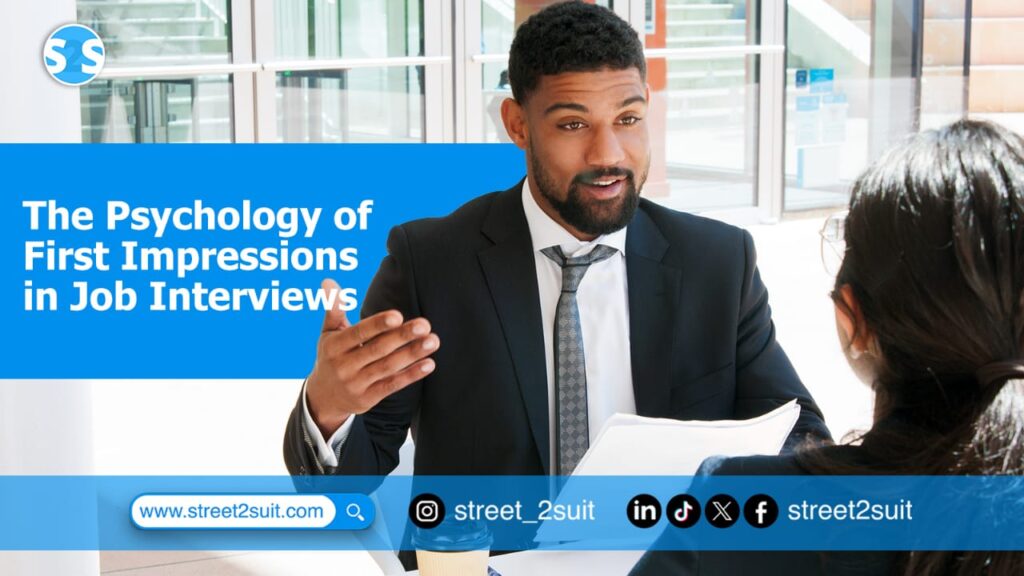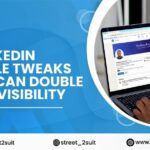If you’ve ever walked into a job interview and immediately felt the interviewer’s eyes sweep over your outfit, your handshake, and maybe even the way you breathe, congratulations, you’ve just experienced the fascinating (and slightly terrifying) psychology of first impressions.
We often hear that “first impressions matter.” What we don’t always hear is that humans make those impressions faster than a Google search. Research shows it takes about seven seconds, that’s shorter than the time it takes to regret wearing new shoes to form an opinion about someone.
In the world of job interviews, those seven seconds could determine whether your interviewer sees you as “potential team material or not.”
So, let’s unpack what really happens in those moments when your fate (and your career prospects) hang between your entrance and your first sentence.
1. Your Brain vs. Their Brain: The Psychology Behind It All
Humans are wired to make quick judgments, it’s part of our evolutionary survival toolkit. Back in ancient times, it is said that humans needed to instantly decide whether the stranger approaching them was a friendly neighbour or someone planning to steal there cave.
Fast-forward to modern times, and that same instinct now plays out in boardrooms and virtual meetings. When you walk into an interview, your interviewer’s brain is subconsciously scanning for clues:
- Are you confident or anxious?
- Organized or chaotic?
- Someone who’ll meet deadlines or create them?
These snap judgments are driven by what psychologists call thin-slicing, which is our ability to make quick inferences from small pieces of information. It’s why an interviewer might decide you’re competent just from how you sit, or friendly based on your smile.
2. The Entrance: Your Silent Resume
Before you even open your mouth, your body language is already writing paragraphs about you.
- Posture: Standing tall signals confidence; slouching suggests insecurity or exhaustion (and no one wants to hire someone who looks like they need a nap before 10 a.m.).
- Eye Contact: Too little, and you look evasive. Too much, and you look like you’re trying to hypnotize the interviewer into hiring you. Balance, dear candidate, is key.
- Handshake (or its modern alternatives): A firm handshake has long been the gold standard, but since COVID-19, we’ve entered the era of awkward waves and elbow bumps. Whatever you do, make it intentional. Nothing says “I’m nervous” like the limp fish handshake or the overly aggressive grip that screams “I’m compensating.”
Your physical presence communicates energy, assurance, and emotional intelligence. Think of it as your nonverbal elevator pitch, you haven’t spoken yet, but your body has already said a lot.
3. The Power of Dress: Psychology in Fabric Form
It’s not vanity, it’s science. Clothes don’t just make the person; they make the impression.
Psychologists call it enclothed cognition, the idea that what we wear affects how others perceive us and how we behave. A sharp outfit can make you feel more confident, while wearing something ill-fitting or uncomfortable can make you fidget, sweat, and mentally spiral into “why did I wear this?” territory.
The trick isn’t overdressing or underdressing, it’s context dressing. If you’re interviewing at a creative agency, showing up in a three-piece suit might make you look like a misplaced banker. Likewise, arriving at a bank in ripped jeans might signal “creative,” but not “hireable.”
The goal is to dress like you already belong, like you’ve time-traveled from your first day on the job and just popped in for the formalities.
4. The Voice Factor: Your Vocal Personality
Your tone, pace, and pitch matter more than you think. Studies show that within seconds, people can infer your confidence level, competence, and warmth from your voice alone.
A calm, steady tone projects assurance, while a rushed, breathless delivery says, “I rehearsed this in front of a mirror and now my brain is buffering.”
Here’s the psychology: when you speak too quickly, the interviewer subconsciously perceives nervousness or lack of control. Speak too slowly, and you risk sounding uncertain or dull. The sweet spot? A conversational rhythm, like you’re explaining something you know well to someone you actually like.
Tip: Before an interview, take deep breaths. You’re not about to run a marathon; you’re just talking about your achievements (which, by the way, are amazing).
5. Facial Expressions: Micro-Expressions Tell the Tale
Your face can betray you faster than your résumé typo. Interviewers subconsciously pick up on micro-expressions. Tiny, involuntary facial movements that reveal genuine emotion.
A fleeting grimace when asked about teamwork? That’s a red flag. A subtle eye roll when describing your former boss? Even bigger red flag.
The key here is authentic composure. You don’t need to plaster on a fake smile like a mall Santa; instead, focus on genuine engagement. Smile when appropriate, nod when listening, and use your expressions to show interest not rehearsed enthusiasm.
Remember: they’re not just evaluating your answers, they’re assessing how emotionally attuned you seem.
6. The Conversational Dance: Listening and Responding
One of the most underrated parts of making a great impression is how well you listen.
Most candidates are so focused on delivering perfect answers that they forget interviews are conversations, not monologues. Listening actively, maintaining eye contact, nodding, asking thoughtful follow-up questions, and creating psychological mirroring. It signals empathy and alignment, making the interviewer subconsciously feel that you “click.”
And when you answer questions, sprinkle in self-awareness and humor. For example:
Interviewer: “Tell me about a challenge you faced at work.”
You: “There was a time our team had to meet an impossible deadline. I discovered caffeine is a wonderful motivator, but so is teamwork.”A bit of light humor humanizes you and makes the interaction memorable.
7. The Halo Effect: When One Good Thing Becomes Everything
Psychologists call it the halo effect. The tendency to let one positive impression color our entire perception of someone.
If the interviewer likes your energy from the start, they’re more likely to view your later answers favorably, even if they’re not perfect. On the flip side, if you stumble early, they might interpret the rest of your responses through a skeptical lens.
In short, first impressions create a mental filter that’s hard to erase. That’s why every detail, the greeting, your smile, your tone builds momentum toward a favorable halo.
So, when in doubt, open with confidence, warmth, and a sense of humor. You’re setting the stage for how everything after that will be interpreted.
8. The Digital Twist: Virtual First Impressions
Online interviews have their own psychological quirks. Suddenly, you’re judged not just on your demeanor but also on your Wi-Fi stability, lighting, and camera angle.
Here’s the modern checklist:
- Lighting: Face the light, not away from it. You’re interviewing, not auditioning for a mystery movie.
- Background: Keep it tidy. A clean space says “organized,” while a messy one says “I might lose files… and also your trust.”
- Eye Level: Position your camera so you’re looking into it, not down at it. No one wants to spend 30 minutes talking to your forehead.
Even online, the same principles apply: posture, tone, and authenticity. The only difference? You might need to pretend your cat didn’t just walk across the keyboard.
9. The Psychology of the Goodbye
The final moments of the interview are your encore. People tend to remember the first and last moments of an interaction more vividly than the middle, a psychological principle known as the primacy and recency effect.
So, leave them with a closing impression that reinforces your best traits. Thank them sincerely, show enthusiasm about the role, and end with something that makes you stand out:
“Thank you for your time. I really enjoyed this conversation and I promise I won’t microwave fish in the office kitchen.”
You’ve made them smile, which means they’ll remember you positively and that’s half the battle won.
Conclusion: It’s Not About Perfection
First impressions matter, but they’re not about perfection, they’re about connection. Interviewers are human too (even if they sometimes seem like emotionless gatekeepers with clipboards). They’re trying to assess not just your qualifications but whether you’d fit the team’s energy.
So don’t obsess over every gesture. Focus on authenticity, confidence, and presence. You can’t control every subconscious reaction, but you can control how you show up with enthusiasm, respect.
Because at the end of the day, psychology aside, people hire people they like.And if you can make someone smile while convincing them you’re qualified? That’s not just a good impression, it’s a lasting one.
Receive the latest job and career updates in your inbox, every week!




